Canon has partnerships with thousands of suppliers, from whom it purchases considerable numbers of components, such as electronic parts, mechanical parts, units and materials. As part of its responsibility as a manufacturer operating a global business, Canon ensures that its procurement activity considers the needs of the global environment and society.
In 2019 Canon joined the Responsible Business Alliance (RBA), a coalition of companies that promotes socially responsible global supply chains.
Guided by its philosophy of kyosei, Canon sets out its basic approach to procurement in its Procurement Policy, which promotes the fair and equitable conduct of business with due consideration for corporate ethics, environmental conservation, and other key concerns. We request all suppliers to ensure that they understand and cooperate with the policy.
We have also formulated the Canon Supplier Code of Conduct, based on the RBA Code of Conduct. We are working with suppliers to develop a socially responsible global supply chain on issues such as labor, occupational health and safety, the environment, corporate ethics and management systems. We also request from second-tier suppliers understanding and adherence to the Canon Supplier Code of Conduct through first-tier suppliers. We publish the code on our corporate website to make it widely known to stakeholders while making it known to suppliers globally through an annual survey.
Canon not only complies with laws and regulations on procurement globally, but also ensures complete fairness and transparency in dealings with its suppliers. Specifically, we established the Canon Group Procurement Code of Conduct for Executives and Employees in Charge of Procurement, which stipulates appropriate actions that persons in charge of procurement as well as executives and employees responsible for placing orders should keep closely in mind in order to maintain high standards of legal compliance and corporate ethics. Also, Canon’s business processes are uniform across its global network based on a common set of detailed rules on procurement practices in place for Group companies worldwide.
To ensure company-wide consistency and uniformity, a department in charge of internal Group controls was set up in the procurement division at Canon Inc. to maintain the rules, monitor compliance, and provide training for employees.
In line with our Procurement Policy, which outlines our intent to open our doors equally to suppliers worldwide and conduct business in a fair and impartial manner, we promote open procurement and invite proposals from suppliers not already in our network.
Canon set up the Suppliers Proposal Site within its corporate website with the purpose of collecting information, including product proposals and information related to production outsourcing (excluding intellectual property such as designs, ideas and inventions), from companies worldwide. Products proposed on this site are now being used in Canon products.
We will continue to duly consider all future proposals based on established rules.
Before starting business dealings with a new supplier, Canon conducts an assessment based on the Canon Supplier Code of Conduct and other reference standards of whether the company fulfills all requisite standards in terms of corporate ethics (legal compliance, product safety, management of confidential information, human rights, labor, health and safety, intellectual property rights protection, etc.), environmental conservation (chemical substance management, prevention of air pollution and water pollution, proper disposal of waste, initiatives aimed at conserving energy and resources, reduction of GHG, and biodiversity conservation), finance, and production structure (quality, cost, delivery, manufacturing capacity, and management).
Only those suppliers who meet these criteria are accepted onto the Supplier List. Canon conducts an annual survey of suppliers registered on the list and makes a comprehensive evaluation based on the survey results, performance as a supplier, and other factors. The results are then reflected in the supplier list, enabling us to preferentially deal with suppliers with high evaluations. We conduct on-site audits of suppliers with low evaluations and provide guidance and instruction for improvement. In particular, Canon may choose to terminate business with suppliers if they are not complying with laws and social norms covering areas such as human rights, labor, and the environment.
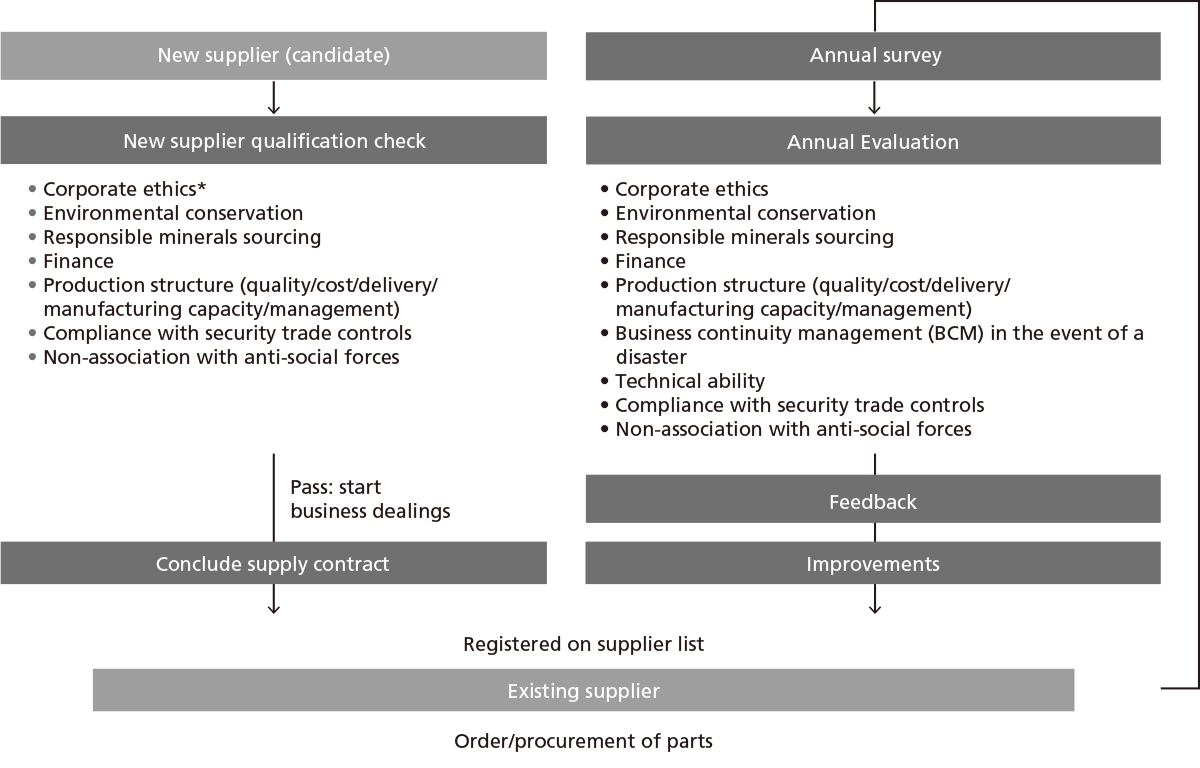
* Corporate ethics covers areas including legal compliance, product safety, management of confidential information, human rights, labor, health and safety, and intellectual property right protection.
For parts and materials suppliers of its main business products (“major suppliers”), Canon uses the RBA’s SAQ to identify their labor, health and safety, environmental, and ethical risks. Our 2022 survey of 340 companies elicited responses from 331 companies (representing 491 sites). No businesses were identified as high risk among these suppliers, but we provided feedback on the results of labor, health and safety, the environment and ethics to our major suppliers and requested that they identify weaknesses and improve on them. In 2022, we also took steps to verify the SAQ responses received from a number of major suppliers in Japan and Asia, including on-site checks.
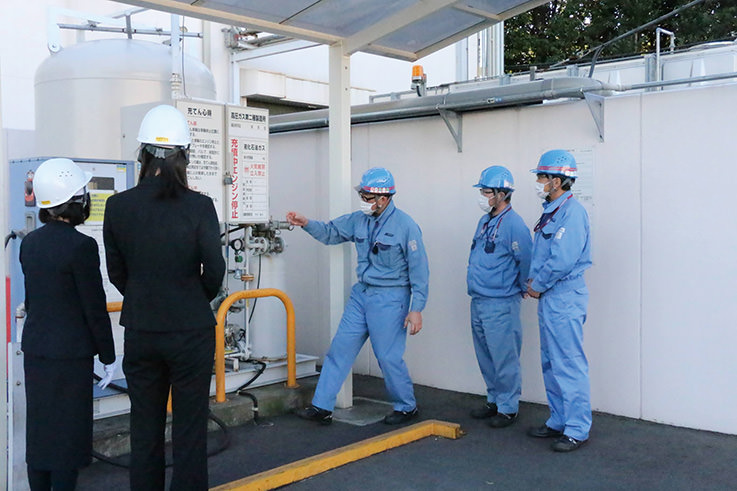
On-site check at a supplier business in Japan
We also request major suppliers to sign an agreement concerning the RBA Code of Conduct. Out of 340 requests, consent was obtained from 328 (96.5%) major suppliers.
Starting from 2022, we additionally carried out risk assessments relating to labor, health and safety, the environment, and ethics, focusing specifically on labor agencies, the companies to which we subcontract operations such as security, cleaning, and cafeteria provision at our core business production sites, and the companies who manage our facilities and dormitories. The risk assessment did not identify any contractors as high risk, but we requested these business partners to carry out monitoring of regulatory compliance and risk and a small number of the suppliers to submit corrective action plans.
In the environmental area, Canon has established Canon Green Procurement Standards, which outline its environment-related requests to suppliers. Suppliers must comply with these standards to do business with Canon. Specifically, we view a supplier’s environmental management as consisting of two interrelated elements: management of business activities, and management of parts and materials. We require that the supplier must operate effective environmental management in each of the four frameworks labeled A–D in the diagram below. If a supplier is found to have a negative impact on the environment, we immediately demand corrective action be taken and check the status of improvements made.
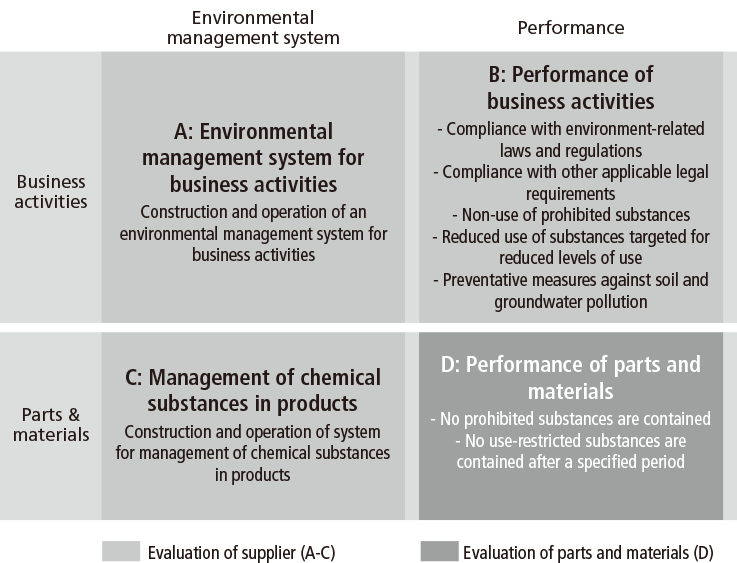
To promote environmental conservation activities, we require all partners throughout the supply chain to work for environmental impact reduction in their business activities by putting in place and operating an environmental management system. Specifically regarding the chemical substance content of products, alongside the requirements of our Green Procurement Standards, we have put in place an in-house system for centralized management of information on the content of such substances in parts and materials so as to exclude the possibility of product contamination with prohibited substances.
It was already Canon’s practice to check the organization and environmental performance of a supplier’s business activities and any corrective measures taken. Now, we have further strengthened our risk management to help prevent pollution in our supply chain. For example, in order to ensure compliance with stricter regulations, we are taking measures to boost information gathering and analysis activities regarding laws and regulations on wastewater and emissions in emerging countries. We are also reinforcing risk management in plating processes, where there is a relatively high risk of environmental pollution associated with wastewater treatment as a certain volume of heavy metals is used. As some of our plating contractors, who constitute tier-two suppliers, lack an in-house wastewater treatment facility and subcontract services to a wastewater treatment provider, Canon now also verifies the compliance status of these subcontractors. Expanding the scope of risk management in this way helps ensure pollution prevention.
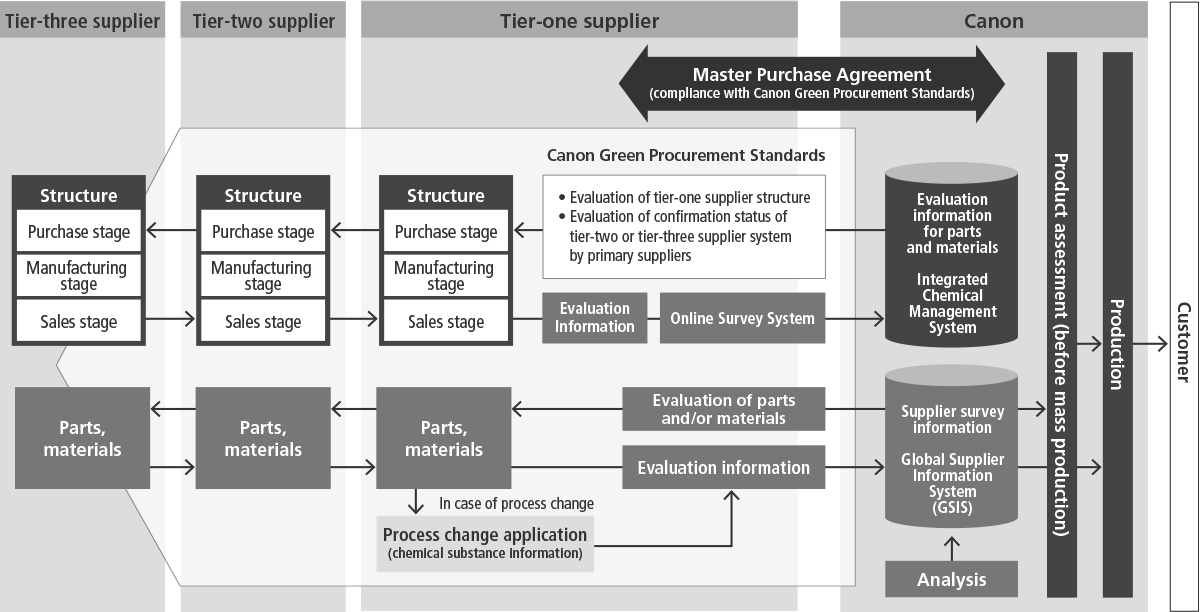
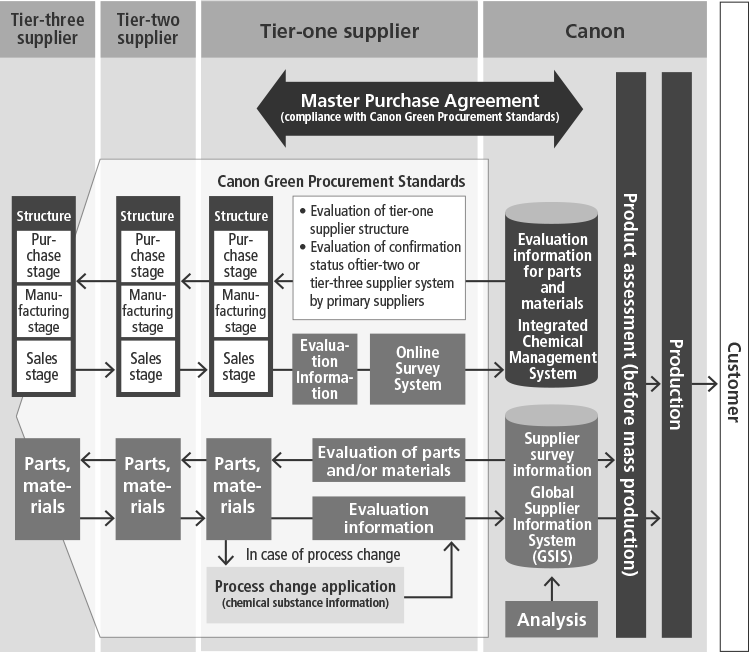
Based on supply chain information published by the Institute of Public & Environmental Affairs (IPE), a Chinese environmental NGO, we help secondary and tertiary suppliers and other Chinese businesses located in the upstream of the supply chain to reduce environmental risk by making recommendations and carrying out improvements. By sharing information regularly and communicating with the IPE on best practice, we contribute to reducing environmental risk throughout the supply chain.
Canon is enhancing its cooperative relationships with suppliers through implementation of the EQCD concept, which stipulates the timely delivery of high-quality products at reasonable prices to customers worldwide, while taking the environment into consideration.
We hold business briefings for suppliers at each Canon Inc. operational site and each Group production site, seeking their understanding of procurement policies and their cooperation with business plans. The Group Executive in charge of Procurement Headquarters at Canon Inc. also holds procurement annual meeting for major suppliers worldwide to request their cooperation in complying with the Canon Supplier Code of Conduct, which includes items related to the environment and human rights, as well as explains procurement policies and reports on activities, in an effort to strengthen cooperation with suppliers.
Through such communication, we aim to share information with suppliers, strengthen collaboration, and grow together.
Canon has set up a hotline to allow anyone inside or outside the company to anonymously report any concerns about the supply chain. This enables whistleblowers to share any specific concerns or information relating to issues such as child labor, forced labor, or other problems in the areas of human rights and occupational health and safety. This process is detailed in the Canon Supplier Code of Conduct and publicized.
Products manufactured and sold by the Canon Group and numerous other corporations contain materials that originate from a variety of minerals. These materials are sourced through diverse supply chains from their places of origin throughout the world. Mineral mining sites, smelters or other processing sites for some of those materials have been shown to have links to armed groups, serious human rights violations or environmental destruction. Corporations are therefore being called upon to exercise their social responsibility by identifying conflict/high-risk regions and avoiding the use of materials supplied from business operators disrespecting human rights or environmental conservation in those regions.
To reassure customers using Canon products, we are working with suppliers and industry bodies on responsible mineral sourcing initiatives.
Canon investigates the countries of origin of minerals and exercises due diligence, following the 5-step framework recommended by the Organisation for Economic Co-operation and Development (OECD) in its Due Diligence Guidance for Responsible Supply Chains of Minerals from Conflict-Affected and High-Risk Areas (OECD Guidance) (Third Edition).
Based on a common Group-wide policy and survey reporting system, Canon identifies products that could contain certain metals or minerals and then conducts investigations of the parts and materials in question, tracing up the supply chain to determine places of origin. Canon exercises due diligence to identify any risk of funding armed groups along with human rights and environmental risks in conflict and high-risk areas around the world. The surveys utilize the Conflict Minerals Reporting Template (CMRT) Revision 6.22 published by the Responsible Minerals Initiative (RMI*), which has been updated to allow assessment of the abovementioned risks. In addition, we use internally developed formats to identify mineral sourcing risks. If investigations uncover significant risks, we work with suppliers to switch to low-risk supply chains, enabling us to carry out socially responsible minerals sourcing.
Since April 2015, Canon has supported the activities of the RMI, an international program focused on addressing the issue of conflict minerals.
In Japan, Canon is active as a leading member of the Responsible Minerals Trade Working Group (RMTWG) of the Japan Electronics and Information Technology Industries Association (JEITA). Canon is also a member of the Conflict Free Sourcing Working Group (CFSWG), which cooperates with JEITA and leading Japanese automakers.
Supplier cooperation is essential in identifying places of origin for minerals and related smelters. Canon takes steps to gain the understanding of suppliers and seek their cooperation with mineral sourcing investigations. This includes compiling a guidance manual on related procedures.
Furthermore, Canon established a page entitled “Procedure for the Submission of Concerns Regarding Mineral Risk” on its official website in 2015. Parties with specific concerns and/or information regarding circumstances of extraction, trade, handling and export of minerals (tantalum, tin, gold and tungsten) in conflictaffected and high-risk areas as they pertain to Canon product supply chains (such as facts indicating that those minerals are the source of funds for armed groups in conflict-affected areas and human rights violations) can contact Canon through this page.
Tin, tantalum, tungsten and gold (3TG) produced in conflict-affected and high-risk areas are said by the United Nations and other authorities to have been used in some cases to provide funding for armed groups allegedly responsible for serious human rights violations, environmental destruction, illegal mining, and other issues. This is generally referred to as the “conflict minerals issue.”
In response, the United States introduced the Dodd-Frank Act in January 2013, which requires listed companies to investigate and disclose whether minerals and metals from the Democratic Republic of the Congo (DRC) and neighboring countries contained in their products could have been used to fund armed groups.
Canon submits a Conflict Minerals Report each year by the end of May to the U.S. Securities and Exchange Commission (SEC) detailing the status of Canon Group activities to address the conflict minerals issue.
In 2022, Canon sent CMRT-based surveys to roughly 3,200 suppliers with a response rate of about 94% (as of March 31, 2023).
As far as can be judged from the responses received, there was no evidence that Canon’s purchasing of parts and materials had financially benefited armed groups in the DRC region. However, the complex nature of the supply chain makes it difficult to identify specific smelters or in many cases to obtain clear responses. Given these and a range of other survey challenges, Canon is working for further risk identification and improvement. Smelters investigated in the survey are disclosed through a Conflict Minerals Report submitted to the U.S. Securities and Exchange Commission (SEC) annually.
In Europe, meanwhile, April 2021 saw the enactment of the EU’s Conflict Minerals Regulation, whose scope is not limited to the DRC and neighboring countries. Canon is not affected by this regulation, but it has carried out a risk assessment of the other countries involved.
Recent years have seen heightened worldwide attention given to the procurement risk associated also with non-3TG mineral substances. Specifically, cobalt — in growing demand for its use in lithium-ion batteries and other applications — is the focus of concern over potential human rights violations, including child labor, at mining locations. From 2021, Canon began providing all suppliers subject to survey with the industry standard survey format for Cobalt (Extended Minerals Reporting Template published by the Responsible Minerals Initiative) in order to investigate the status of cobalt use in Canon products and conduct related risk analysis. We will continue responding to this risk in collaboration with suppliers and industry associations.
Canon undergoes audits by independent private sector experts to gain independent assurance on whether the Group’s initiatives on conflict minerals investigation conform to international standards in the form of the OECD Guidance. An independent assurance report is attached to the Conflict Minerals Report filed with the SEC.
The Modern Slavery Act 2015 enacted in the United Kingdom in 2015 mandates that enterprises of a certain scale operating in the UK publish annual statements detailing the risk of forced labor, human trafficking and child labor within their own operations and supply chain. In 2018, Australia enacted a Modern Slavery Act, under which companies above a certain size operating in Australia are required to evaluate the risk of forced labor and other issues in the supply chain and in their own business activities and to disclose measures taken to reduce the risk.
Annual statements are published by Canon Group companies that fall within the scope of the law, based on the information on human rights risk assessments conducted by Canon Group production sites and suppliers.
Annual statements are also published by Canon Medical and Axis in compliance with this legislation.
